Broker Client Markups
Automatic billing, flexible commission markups and interest markups and markdowns are part of our turnkey solution for broker/dealers and introducing brokers.
Commission Markups
Brokers have the ability to charge their clients for services rendered based on a fee-per-trade unit for each asset class (e.g. stocks, options, etc.), exchange and currency. The trade unit is determined by the unit Interactive Brokers uses for its commissions charges and can be on a per share, per contract, or % of trade value basis.
Specify all commission markups on the Client Fees page in Account Management.
Client Fee Templates
Client fee schedules can be applied to accounts individually or can be stored in templates. As a broker, you can configure fees for one or more client accounts, or set up client fee schedules in templates, then assign the templates to client accounts. The use of templates allows you to easily maintain different fee schedules for multiple client accounts.
If you are a new broker (i.e. you just opened your IBKR account), then there will be a blank default client fee template, which you can then configure with your own fee schedule. If you are an existing broker, your old global fee schedule is now the default client fee template. You can modify the default template but you cannot delete it.
Rules for Broker Client Fees
The following general rules apply to broker client fee schedules:
- If a broker has not created a fee schedule for an individual account, then the default client fee template will automatically apply to that account.
- If a broker has not created any fee schedule at all, either a client fee template or fee schedules for individual accounts, then Interactive Brokers' standard commissions will be charged with no markup for the broker.
- Broker client markups are generally limited to 15 times Interactive Brokers' standard commissions.
- No fee per trade will be applied if the client calls IBKR to close a trade.
- Brokers can also specify fees per trade for specific products and exchanges.
- Fees and markups owed to fully disclosed and non-disclosed brokers are sent to the master account and then swept to the broker's Proprietary Account for Broker-Dealers every night.
- Auto liquidation trades are not subject to markups.
Types of Broker Client Markups
For each asset class/currency, a broker can select one of the fee-per-trade client markup types listed below:
Brokers can specify a minimum amount to charge per trade. The minimum amount cannot exceed the following limits:
| Currency | USD | EUR | CHF | GBP | CAD | JPY | HKD | SEK | MXN | KRW | AUD |
|---|---|---|---|---|---|---|---|---|---|---|---|
| Minimum Fee Per Trade Limit | 25 | 20 | 30 | 15 | 30 | 2500 | 160 | 175 | 250 | 20000 | 30 |
Note that you cannot enter both a minimum amount per trade and a ticket charge. You can enter one or the other.
Example
For example, a broker enters 1 in the Min column for Stocks/CAD for an individual client account. The minimum broker client fee for a stock trade in CAD for that client will be 1.00. A broker would typically set the Minimum Amount in conjunction with other types of client markups for a specific asset class/currency.
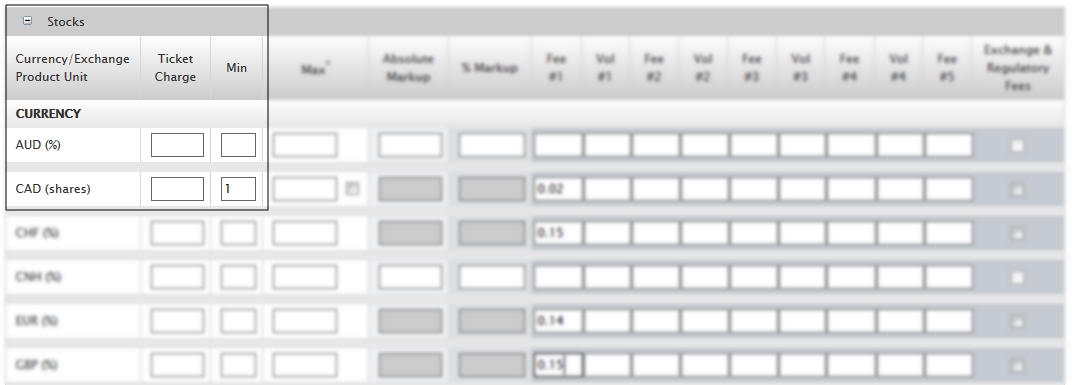
Brokers can specify a maximum amount to charge per trade. They can also configure the Maximum Amount as a percent of trade value for stocks in USD and CAD by clicking the check box below the Max entry field on the Client Fees page in Account Management.
Example
For example, a broker enters 5 in the Max column for Stocks/CAD for an individual client account. The maximum broker client fee for a stock trade in CAD for that client will be 5.00. A broker would typically set the Maximum Amount in conjunction with other types of client markups for a specific asset class/currency.
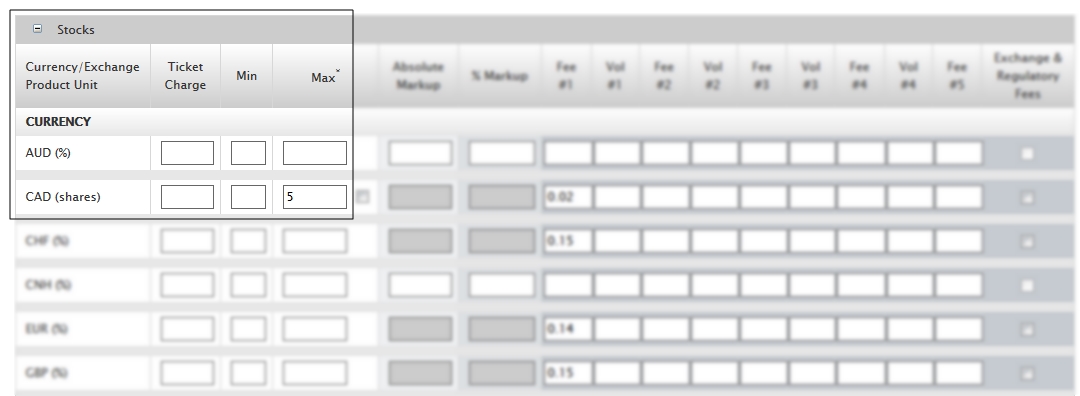
In another example, a broker enters 1 in the Max column for Stocks/CAD for an individual client account, and selects the check box below the Max field, indicating that this Maximum Amount will be calculated as a percentage of trade value of Stocks/CAD. The maximum broker client fee for a stock trade in CAD for the client will be 1% of the stock trade value.
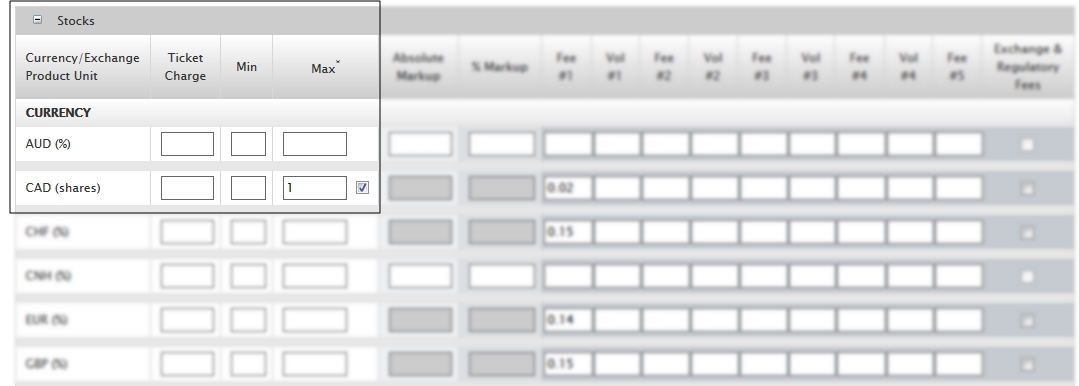
Brokers can specify a ticket charge per trade. A ticket charge is simply an additional flat fee. You cannot specify both a minimum amount AND a ticket charge for a single asset class/currency.
Example
For example, a broker enters 25 in the % Markup column for Stocks/CHF and then enters 1 in the Ticket Charge column for an individual client. The broker markup for a stock trade in Swiss Francs for this client will be 25% of the Interactive Brokers commission + 1CFH.
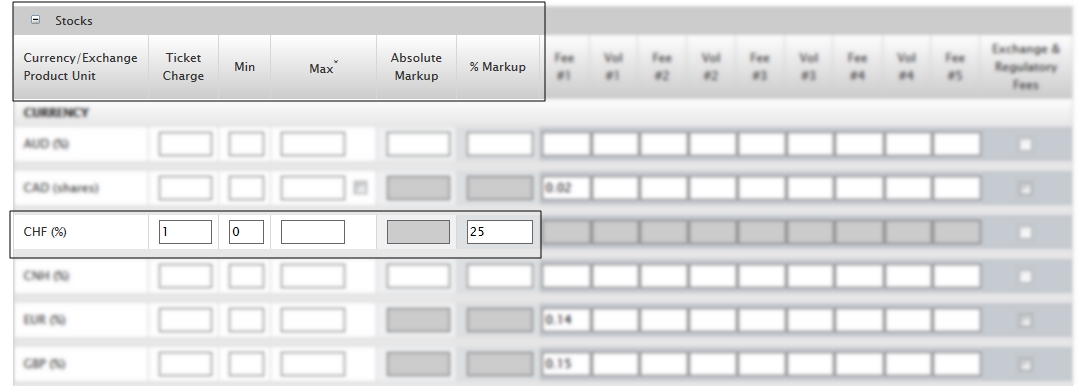
Absolute Markup
Brokers can charge an Absolute Markup per trade. Absolute Markup is a specific amount added to the Interactive Brokers commission. Brokers enter an Absolute Markup in the currency or exchange of the asset class. On the Client Fees page in Account Management, the units listed in the Currency/Exchange/Product Unit column indicate if the absolute markup gets applied to shares, contracts, or % of notional value. Absolute Markup amounts can include up to three decimal places.
Example
For example, a broker enters 1 as the Absolute Markup for USD Stock and Index Options. Later, one IBKR Smart option contract is executed. The client will be charged $2 ($1 IBKR commission + $1 Absolute Markup).
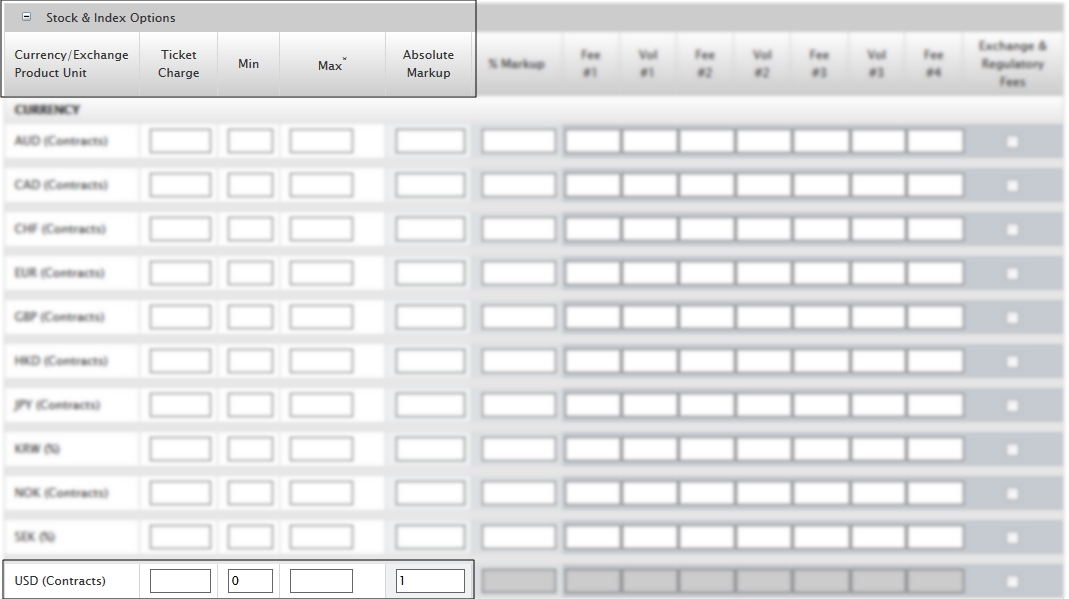
Tiered Absolute Amount
Brokers can charge an Absolute Amount from which Interactive Brokers' commission is subtracted. You can set up to three tiers for Absolute Amount based on volume breaks. Brokers should monitor their clients commissions as it is possible for Interactive Brokers to charge more than the client fee.
To set an Absolute Amount, enter one to three fees (Fee#1, Fee#2, Fee#3), and enter volume breaks (Vol#1, Vol#2) on a per trade basis on the Client Fees page in Account Management. The units listed in the Currency/Exchange/Product Unit column indicate if the absolute markup gets applied to shares, contracts, or %. Absolute Amounts can include up to three decimal places.
Example
For example, a broker wants to charge 0.05 USD for up to 500 shares of stock, 0.03 USD for up to 1,000 shares, and 0.002 USD above 1,000 shares, along with a ticket charge of 1 USD.
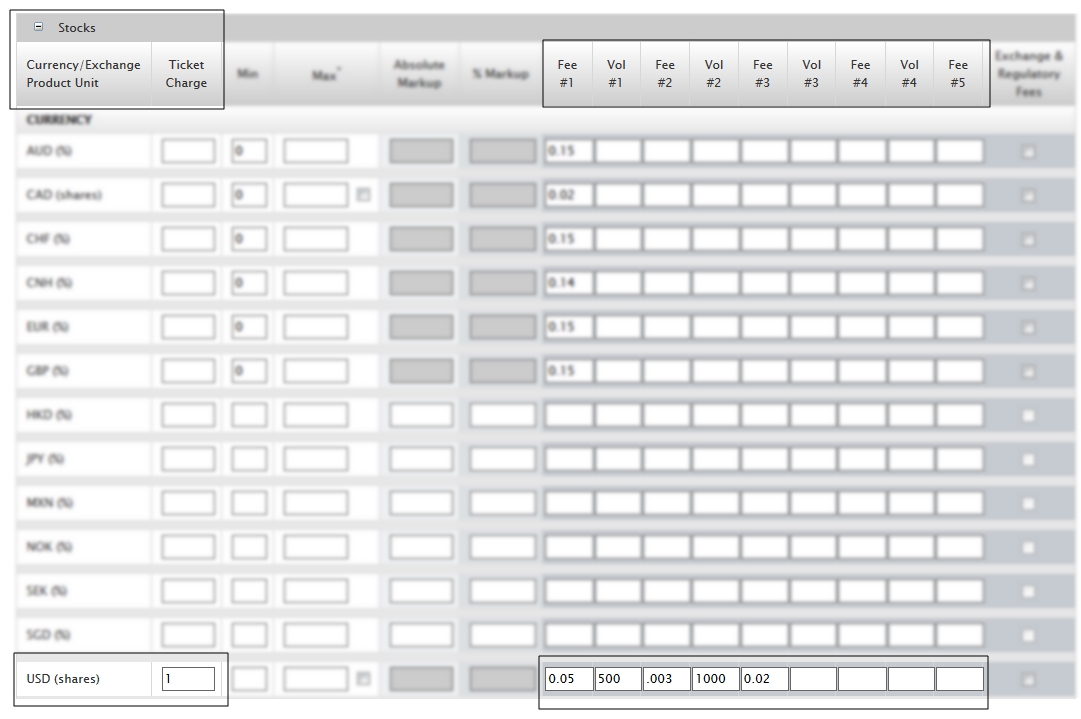
Client Absolute Tiered Commissions are mutually exclusive from Interactive Brokers Tiered Commissions. They can be combined with IBKR Tiered Commissions, or one client absolute rate can be used with IBKR Tiered Commissions.
Brokers can specify a percentage of Interactive Brokers' standard commission to charge per trade. Enter % Markup as a percentage without the decimal point.
Example
For example, a broker enters 100 in the % Markup column for Stocks/EUR for an individual client, indicating that stock trades for this client will carry a broker markup of 100% of IBKR's commission. If IBKR charges 10 EUR for a stock trade, the % Markup will be 10 EUR (100% * 20 EUR). The client will be charged a total of 20 EUR for a stock trade (10 EUR IBKR Commission + 10 EUR % Markup).

In addition to (or on top of) an absolute fee, a broker can pass any exchange or regulatory fees through to the customer by selecting the Exchange & Regulatory Fees option. These fees can only be entered when Absolute Amounts are set. Brokers can also specify a tiered commission schedule and Exchange & Regulatory Fees for specific products and specific exchanges.
Example
For example, 1,000 shares @ $.05 per share + Exchange Fee of $.003 per share = (1,000 * .05) + (1,000 * $.003) = Total Fee charged of $53.00.
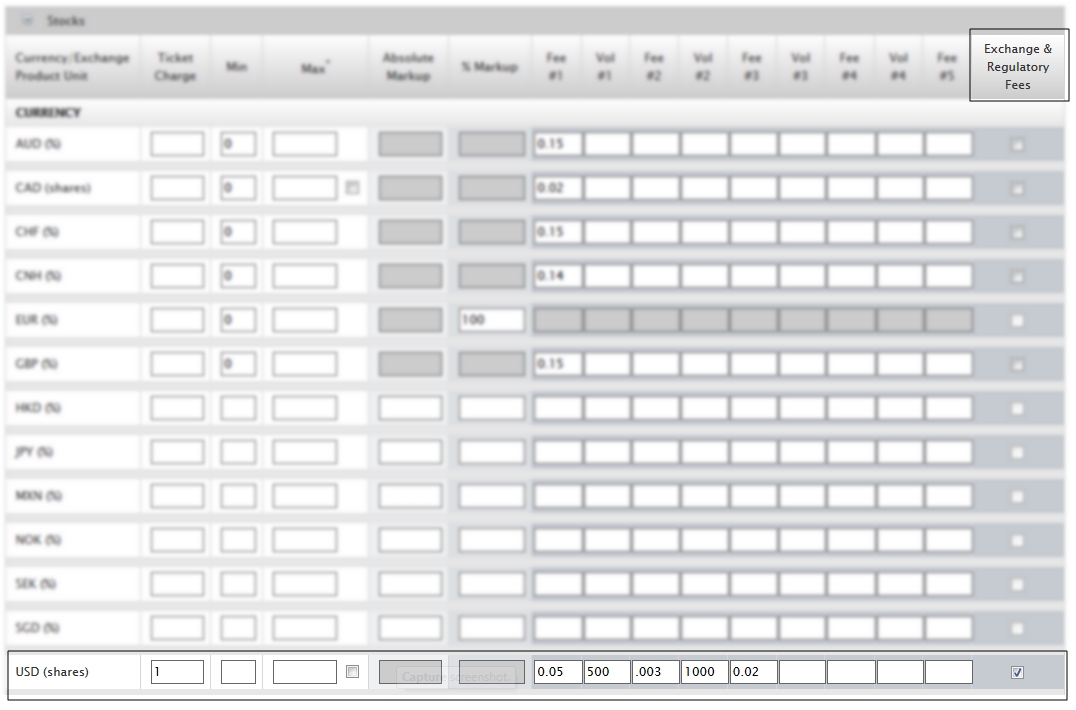
Brokers can charge markups on prime trades of certain currency/product units. This section only appears for brokers who have at least one client who subscribes to our IBKR Prime institutional service.
Example
For example, a broker enters 5 in the Ticket Charge column for CAD futures options in the Take Up Fees section for an individual client who is subscribes to our IBKR Prime service. The broker markup for a futures options trade in Canadian dollars for this client will be $5.00 per trade.
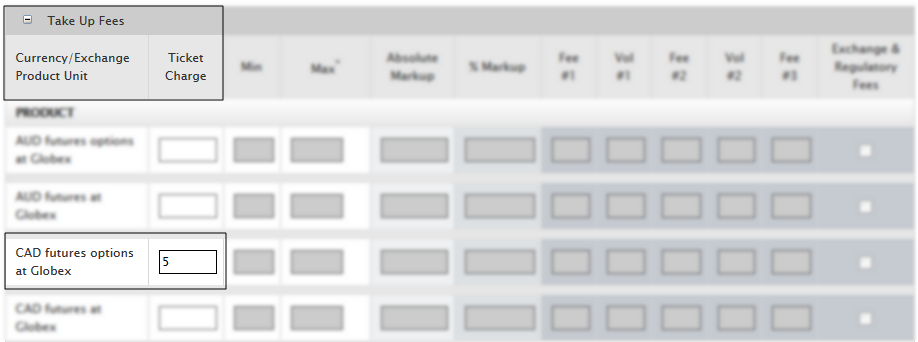
Markup Summary
Brokers can view all commission markup schedules for their client accounts on the Markup Summary page in Account Management. The Markup Summary sorts information by fee schedule, and displays client accounts that use the global markup schedule together.
Trade Allocation Minimum Commissions
We charge a minimum fee for US stock trades allocated by Brokers to their clients. Brokers can choose to charge the allocation minimum fee to their master account or to the client account. By default, the allocation minimum is charged to the client account unless there is a specific rate arrangement between the client and the Broker.
The minimum amount charged per trade allocation is as follows:
- Fixed Rate Pricing Minimum: Minimum (trade value * 0.0005, USD 1)
- Tiered Pricing Minimum: Minimum (trade value * 0.0005, USD 0.35)
Interest Markups and Markdowns
Brokers can mark down credit and short proceeds credit interest and mark up debit interest. Markups and markdowns are entered as % with the following fields available for input:
- Pay Client No Credit Interest - If this box is checked all credit and short proceeds credit interest will be paid to the broker and the client will not receive any revenue.
- Credit Markdown - A % amount will be subtracted from the credit interest paid and given to the broker. Clients will not be charged negative interest so if the markdown is greater than the currently available credit interest rate then no interest will be paid.
- Debit Markup - A % amount will be added to the debit interest. The maximum markup is 5%.
- Short Credit Markdown - Operates like the Credit Markdown. A % amount will be subtracted from the short proceeds credit interest paid and given to the broker.
Borrow Fee Markups
Brokers can charge markups to their clients based on our stock borrow rates, entered as a variable or fixed percentage of our borrow rate. You can enter both types of markups and our system will apply the markup rate that results in the larger total amount.
- Variable borrow fee markup - This is a variable percentage of our borrow rate. The total cost to your client is calculated as follows:
Borrow Rate (1 + Variable Markup Percentage)
The range of acceptable values that you can enter is 0 - 25%. - Fixed borrow fee markup - This is a fixed percentage of our borrow rate. The total cost to your client is calculated as follows:
Borrow Rate + Fixed Markup Percentage
The range of acceptable values that you can enter is 0 - 1%.
Example
Symbol ABC Borrow Rate = 35%
Variable Borrow Markup = 20%
Fixed Borrow Markup = 1%
Calculating the total cost to your client, we have:
Variable markup
35% (1 + 20%) = 42% total cost to your client
or
0.35 (1.2) = 0.42
Fixed markup
35% + 1% = 36%
or
0.35 + 0.01 = 0.36
Our system applies the larger total amount, so in this example, we would apply the Variable Borrow Markup and the total cost to your client is 42%, which includes our borrow rate plus your borrow markup.
Note: Interest markups and markdowns are rounded to two decimals.
Electronic Invoices
Fully-disclosed brokers can configure and submit electronic invoices from the Invoicing page from the Manage Client > Fees menu in Account Management. Before you can submit fee invoices for client accounts, you must first configure Automatic Billing for Monthly/Quarterly Invoicing for the account(s) on the Invoicing page. You must specify a monthly or quarterly markup limit, then calculate the markup and submit an electronic invoice for each client account at any time, up to the specified limit. The invoice amount will be automatically transferred from the client account to the broker account. Invoices submitted prior to 5:30 (17:30) PM EST will be processed by IBKR the same day (U.S. night) and appear on that day's statements. Invoices submitted after 5:30 (17:30) PM EST will be processed by IBKR on the next business day. You can submit invoices for up to ten clients at a time, but only one invoice per client account per day.
You can also upload a .csv (comma-separated values) file containing multiple client invoices. The .csv file must contain fields for:
- Client Account Number
- Amount (in client account's base currency)
- Memo (this field is optional)
Invoices submitted after 5:30 (17:30) PM EST will be processed by IBKR on the next business day. You can submit invoices for up to ten clients at a time, but only one invoice per client account per day.
Caps and Limitations
Introducing Broker client markups are limited to 15 times IBKR's highest tiered rate + external fees. In the case of US stocks, the highest tiered rate would be 0.0035 USD per share. USD-denominated bonds are subject to a separate cap on mark-ups. US option mark-ups are limited to 10% of trade value. 25% of debit interest markups over 1% will be collected by IBKR. These limits are subject to change, and specific products may have an additional limit in place. No markups will be applied if a client calls IBKR to close a position.
